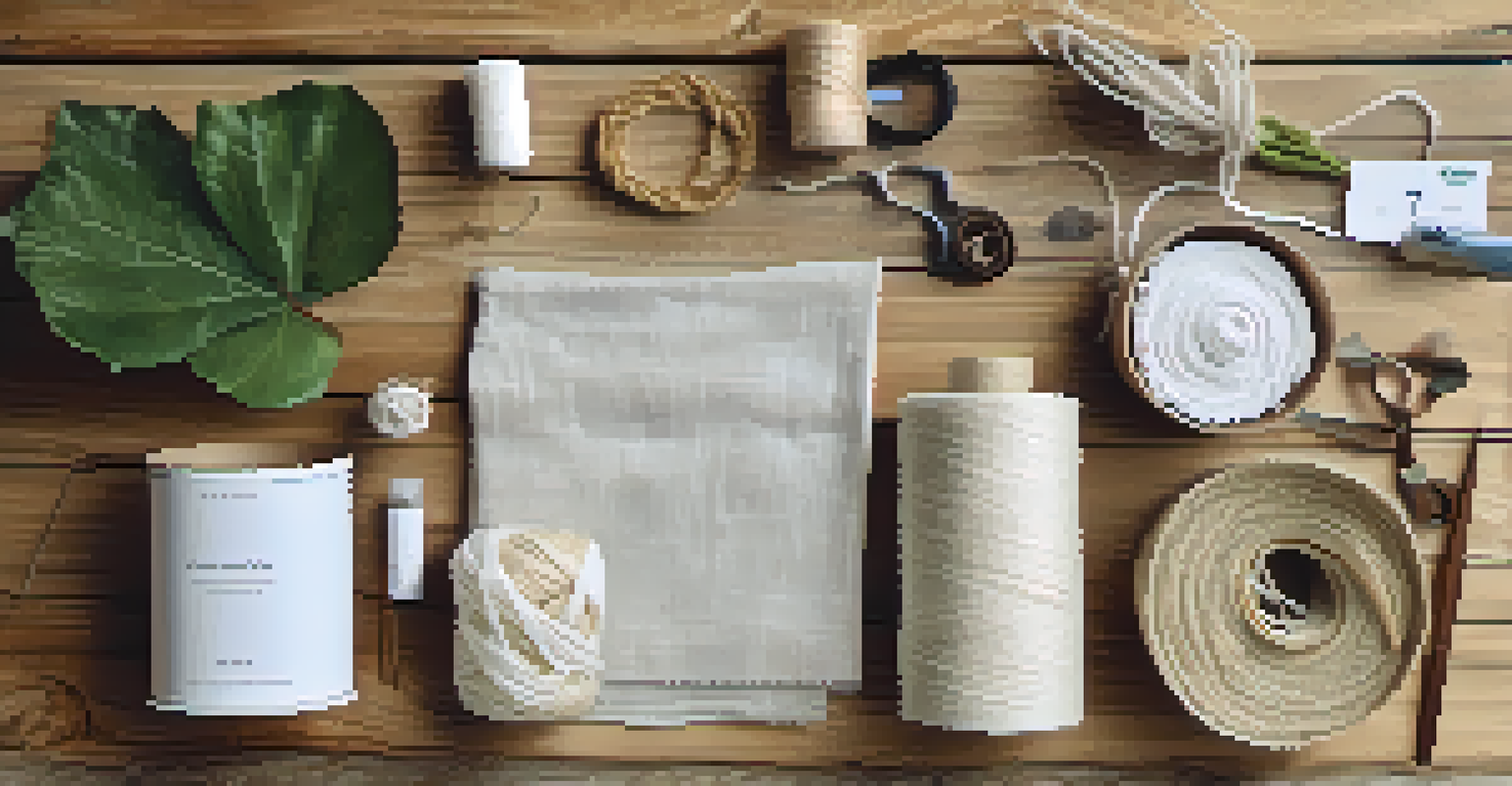Understanding Ethical Fashion: A Guide to Sustainable Choices

What is Ethical Fashion and Why Does It Matter?
Ethical fashion refers to clothing that is produced in a way that values both the environment and the people involved in its creation. It focuses on fair labor practices, sustainable materials, and reducing waste. In a world where fast fashion dominates, understanding ethical fashion becomes essential for conscious consumers.
Fashion is the second dirtiest industry in the world, next to the oil industry.
Imagine your favorite shirt; now consider the journey it took to reach your closet. Ethical fashion seeks to ensure that everyone involved in that journey—from the cotton farmer to the factory worker—is treated fairly. By choosing ethical brands, you're making a statement about the kind of world you want to live in.
Moreover, the environmental impact of the fashion industry cannot be ignored. By supporting ethical fashion, you contribute to a movement that prioritizes the planet, encouraging brands to adopt sustainable practices and reduce their carbon footprint.
Key Principles of Ethical Fashion
At the heart of ethical fashion are several guiding principles, including fair trade, transparency, and sustainability. Fair trade ensures that workers receive fair wages and safe working conditions, while transparency means brands openly share their production processes. Sustainability focuses on using materials and methods that minimize environmental harm.

For instance, brands that utilize organic cotton not only avoid harmful pesticides but also promote biodiversity. By choosing materials that are kind to the Earth, these brands are paving the way for a greener future. It's like planting a tree; each sustainable choice contributes to a healthier ecosystem.
Ethical Fashion Benefits People & Planet
Ethical fashion prioritizes fair labor practices and sustainable materials, ensuring a positive impact on both workers and the environment.
These principles work hand in hand to create a fashion industry that respects both people and the planet. When we understand and support these values, we foster a culture of responsibility and care within the fashion world.
How to Identify Ethical Fashion Brands
Identifying ethical fashion brands might seem daunting, but it's easier than you think! Start by looking for certifications such as Fair Trade, GOTS (Global Organic Textile Standard), or B Corp. These labels ensure that brands adhere to ethical practices throughout their supply chains.
The future of fashion is not just about what we wear, but how we wear it and who we wear it for.
Another helpful tip is to research the brand's story. Many ethical brands openly share their values, production methods, and the people behind their products. Just like meeting a friend for coffee, getting to know a brand can help you feel more connected to your purchase.
Social media can also be a goldmine for finding ethical brands. Many companies showcase their commitment to sustainability through engaging content, allowing you to explore their initiatives and values easily. Following these brands not only keeps you informed but also inspires you to make better choices.
The Role of Second-Hand Shopping
Second-hand shopping plays a vital role in the ethical fashion movement by promoting a circular economy. When you purchase pre-owned clothing, you give new life to garments that might otherwise end up in a landfill. This practice not only saves money but also reduces the demand for new production.
Think of it this way: every time you buy second-hand, you're helping to extend the lifecycle of clothing, much like bringing a vintage piece to a modern gathering. Each item has a story and contributes to a more sustainable wardrobe.
Identify Ethical Brands Easily
Look for certifications and research brand stories to find ethical fashion labels that align with your values.
Thrift stores, online resale platforms, and clothing swaps are fantastic avenues for discovering unique pieces while supporting ethical fashion. By embracing second-hand shopping, you actively participate in reducing waste and promoting conscious consumer habits.
Understanding Sustainable Materials in Fashion
Sustainable materials are the backbone of ethical fashion, and understanding them can significantly impact your choices. Common sustainable materials include organic cotton, hemp, Tencel, and recycled fibers. Each of these options is designed to minimize environmental harm while maintaining quality.
For example, Tencel is made from sustainably sourced wood pulp and is known for its softness and breathability. It's like wearing a gentle hug, knowing that it came from a responsible source. When you choose sustainable materials, you're not just investing in a piece of clothing—you're investing in the planet's future.
By familiarizing yourself with these materials, you can make informed decisions that align with your values. When shopping, look for labels that highlight sustainable sourcing, ensuring that your wardrobe reflects your commitment to ethical fashion.
The Impact of Fast Fashion on the Environment
Fast fashion has a significant negative impact on the environment, contributing to pollution, waste, and resource depletion. The rapid production model leads to overconsumption and a throwaway culture, where clothing is worn only a few times before being discarded. This cycle creates mountains of textile waste in landfills.
Imagine a fashion show where instead of models, the runway is filled with discarded clothes. That's the reality of fast fashion's consequences. By supporting ethical fashion, we can help turn this tide and promote a more sustainable approach to clothing.
Ethical Fashion Values Explained
Ethical fashion focuses on fair labor practices, sustainable materials, and reducing waste to create a more responsible clothing industry.
Understanding the environmental impact of our clothing choices empowers us to make better decisions. Each time we choose ethical fashion over fast fashion, we take a stand against this harmful cycle and advocate for a healthier planet.
Tips for Building an Ethical Wardrobe
Building an ethical wardrobe starts with mindful shopping. Begin by evaluating your current closet; identify gaps and prioritize versatile pieces that you can mix and match. This approach reduces the need for excessive purchases and encourages a more intentional style.
Consider creating a capsule wardrobe, which consists of a limited selection of essential items that can be combined in various ways. Imagine having a collection of clothing that feels cohesive and effortless, allowing you to express your style without clutter. This not only simplifies your life but also aligns with ethical fashion principles.

Lastly, remember that ethical fashion is not about perfection. It's about making conscious choices that reflect your values. Every small change adds up, and by prioritizing ethical brands and sustainable practices, you contribute to a brighter future for fashion.